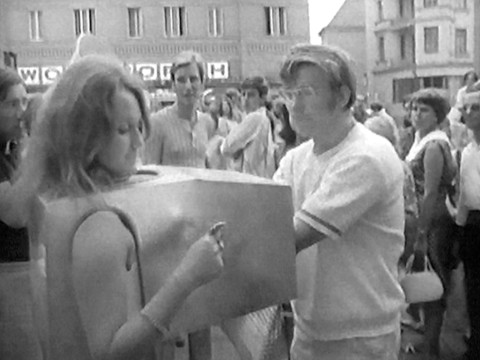Waltraud Lehner was born in1940 in Linz, Austria, and by 1967, she had become VALIE EXPORT. That year, despite or due to her upbringing in a convent, she underwent a personal revolution following her arrival in Vienna at the height of Actionism—a countercultural art movement known for graphic bodily mutilations and lawbreaking protests against artistic and societal pretensions. As a result, she combined an abbreviation of Waltraud with a reference to her preferred brand of cigarettes—Smart Export—to adopt the name VALIE EXPORT.
With her newfound identity, EXPORT rejected the naming of herself by men (her father and later her former husband) to take an anti-patriarchal stance that reflected her concerns with feminist issues and social change. Using the brand of a product, she also devised an artistic logo featuring her portrait pasted onto a cigarette pack. While essentially commodifying EXPORT, the emblem served to oppose the control and objectification of women in society and the female body in the media—a seemingly contradictory move that foreshadowed much of EXPORT's work for the next four decades. Provocative, yet politically engaged, she often challenges herself and viewers by taking on roles and presenting imagery that she ultimately aims to critique. Moreover, her pseudonym demonstrates her ongoing concern with identity, a critical aspect of the way in which we experience reality, as well as her stated desire “to 'export' [herself], to bring ideas out of the harbor.”
Indeed, during the 1960s and 1970s EXPORT became known for racy guerrilla performances in which she (literally) brought herself and body out to the public, making her a pioneer in media, performance, and conceptual art. Her practice, however, comprises a wide range of media, including video, photography, installation, sculpture, and drawing, that she has exhibited in documenta 6 (1977) and documenta 12 (2007) as well as numerous other solo and group shows throughout the world. EXPORT also is an arts writer, feminist theorist, and distinguished filmmaker of narrative and documentary works, such as _Die Praxis der Liebe (The Practice of Love)_, which was nominated in 1985 for a Golden Bear Award, the top prize of the Berlin International Film Festival.
In many ways, film and the cinematic experience have been central to EXPORT's artistic practice, and they have been vehicles for articulating her feminist politics. EXPORT’s films, including her first feature _Unsichtbare Gegner (Invisible Adversaries_; 1976), often explore female psychic states that are counter-normative yet sincere and profound. Further, her performances critique the ways in which we understand popular cinematic representations, particularly those of the female body. One of her most (in)famous pieces— _Aktionshose: Genitalpanik (Action Pants: Genital Panic_; 1968)—took place in a Munich art cinema that was known for showing sexually explicit films. During a screening, EXPORT walked up and down the aisles wearing crotchless pants, daring male audience members to look at her real body rather than the imagery onscreen. Her presentation pointed to the irony of the ease and desire with which one looks at simulated, manipulated imagery of the nude female body while the confrontation of an actual body causes panic.
In _Genital Panic_, EXPORT combines commentary on fantasy versus reality as well as societal norms and notions of public versus private. Likewise, _Touch Cinema_ (1968)—arguably her most revolutionary work—expands on those themes by redefining the way in which one "apprehends" the cinematic female body. In ten different European cities between 1968 and 1971, EXPORT roamed the streets with a cardboard box/mini movie theater strapped to her nude torso. She invited passersby (men, women, and children alike) to insert their hands into the box and grope her breasts for twelve seconds. With her body available tactilely, rather than visually, neither EXPORT nor the participants broke any laws. However, they did subvert and circumvent societal restrictions. That is, they publically engaged in outlawed activities within the privacy of EXPORT's box/theater. Moreover, _Touch Cinema_ addresses a chasm between the perception of reality and its representation. By introducing a new or different dimension to the way in which a woman's body is presented to the public, EXPORT thereby suggested that there is more to the female form than meets the eye. _—Kanitra Fletcher_

